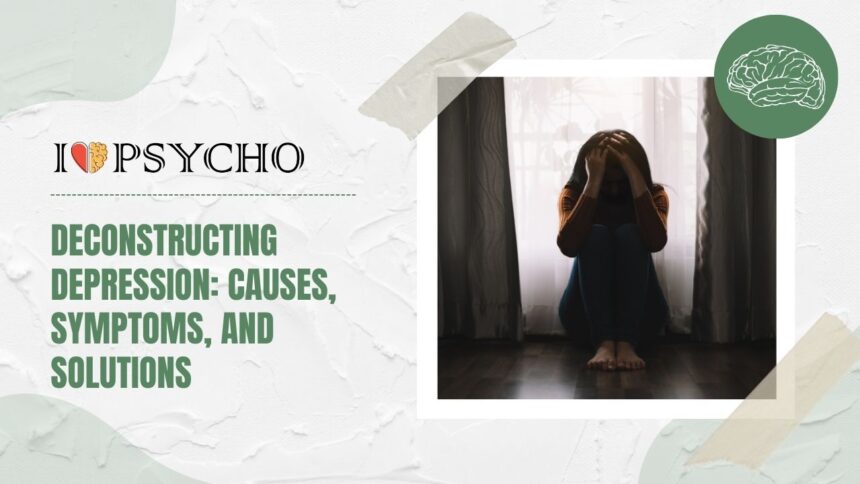Introduction to Depression
Welcome to a deep dive into the intricate world of depression – a topic often shrouded in misunderstanding and stigma. Today, we’re breaking down the causes, symptoms, and solutions surrounding this complex mental health condition. So grab a cup of tea, settle in, and let’s unravel the layers of deconstructing depression together.
The Causes of Depression
When exploring the causes of depression, it’s essential to consider a combination of factors that can contribute to this complex mental health condition. Biological factors such as genetics, chemical imbalances in the brain, and hormonal changes play a significant role in predisposing individuals to depression.
On the psychological front, past traumas, low self-esteem, and negative thought patterns can all be triggers for depressive episodes. These internal struggles often intertwine with external environmental factors like stressful life events, chronic illness, or substance abuse.
Understanding these multifaceted causes can help us grasp the intricate nature of depression and why it affects each individual differently. By shedding light on these underlying reasons behind depression onset, we take a step towards promoting empathy and support for those navigating their way through this challenging journey.
– Biological factors
When it comes to understanding depression, one of the factors that play a significant role is biology. Our brain chemistry and structure can influence our susceptibility to depression. Neurotransmitters like serotonin and dopamine impact our mood regulation. Imbalances in these chemicals may contribute to the development of depressive symptoms.
Moreover, genetics also play a part in predisposing individuals to depression. Research suggests that having family members with a history of depression can increase one’s likelihood of experiencing it too. Certain genetic variations may make some people more vulnerable to developing depression under stressful circumstances.
Furthermore, hormonal imbalances can also be linked to depressive episodes, particularly in women during times such as pregnancy or menopause. The intricate interplay between biological factors and mental health underscores the importance of considering all aspects when addressing and managing depression effectively.
– Psychological factors
When exploring the causes of depression, it’s essential to consider the impact of psychological factors. Our thoughts and emotions play a significant role in our mental well-being. Negative thinking patterns, such as constant self-criticism or rumination, can contribute to the development of depressive symptoms.
Additionally, past experiences like trauma or childhood adversity can shape how we perceive ourselves and the world around us. Unresolved emotional issues may manifest as depression later in life. Furthermore, personality traits like perfectionism or low self-esteem can also increase vulnerability to depressive episodes.
It’s important to address these psychological factors through therapy and counseling. By understanding and challenging negative thought patterns, individuals can learn healthier coping mechanisms and improve their overall mental health. Seeking professional help is a crucial step towards managing depression effectively.
– Environmental factors
When it comes to environmental factors that can contribute to depression, the world around us plays a significant role. Our surroundings have the power to either uplift or dampen our mood, affecting our mental well-being in various ways.
One common environmental factor is stress from work or personal relationships. High-pressure environments and toxic relationships can fuel feelings of sadness and hopelessness, leading to depressive symptoms.
Additionally, exposure to trauma or adverse life events such as loss of a loved one, abuse, or financial difficulties can trigger depression. These experiences can deeply impact our emotional state and overall mental health.
Furthermore, societal influences like social media pressure, societal expectations, and cultural norms can also shape our perception of ourselves and contribute to feelings of inadequacy or comparison-induced despair.
It’s important to recognize how these external factors play a role in our mental health so that we can take steps towards creating a more positive and supportive environment for ourselves.
Identifying the Symptoms of Depression
Depression often manifests itself in various ways, making it crucial to recognize the symptoms. Physical signs can include changes in appetite or sleep patterns, unexplained aches and pains, or low energy levels that persist despite rest.
Emotional and behavioral symptoms may manifest as feelings of sadness, hopelessness, irritability, or loss of interest in activities once enjoyed. Individuals might also struggle with concentration difficulties, memory issues, or thoughts of self-harm.
It’s important to pay attention to these signs and seek help if you notice them consistently impacting your daily life. Talking to a healthcare professional is the first step towards understanding and managing depression effectively. Remember that seeking support is not a sign of weakness but a proactive approach towards better mental health.
– Physical symptoms
When it comes to depression, the physical symptoms are often overlooked but can be just as significant as the emotional ones. People experiencing depression may find themselves feeling fatigued even after a full night’s sleep. This persistent tiredness can make daily activities feel like an uphill battle.
Headaches and bodily aches without any clear cause can also manifest in those with depression. These pains might not respond well to typical treatments, adding to the frustration someone already feels. Changes in appetite or weight fluctuations are common signs too; either overeating or loss of interest in food can occur.
Sleep disturbances such as insomnia or oversleeping disrupt the body’s natural rhythm, leading to added stress and exhaustion. These physical manifestations serve as important indicators that something deeper might be going on beneath the surface.
– Emotional and behavioral symptoms
When it comes to emotional and behavioral symptoms of depression, it can manifest in various ways that may not always be obvious to others. You might find yourself feeling constantly sad or empty, losing interest in activities you once enjoyed, or experiencing persistent feelings of hopelessness.
Depression can also impact your sleep patterns, leading to insomnia or oversleeping. Changes in appetite and weight fluctuations are common as well. Irritability, restlessness, and difficulty concentrating might become daily struggles.
Behaviorally, you might notice a lack of energy or motivation to engage in tasks. Procrastination and indecisiveness could hinder your ability to complete even simple chores. Social withdrawal may occur as interacting with others feels overwhelming.
Recognizing these emotional and behavioral symptoms is crucial in seeking help and beginning the journey towards healing from depression.
Seeking Help and Support for Depression
When facing depression, seeking help and support is essential for healing. It’s crucial to reach out to trusted friends, family members, or mental health professionals who can offer guidance and understanding. Opening up about your struggles can alleviate the weight on your shoulders.
Therapy sessions provide a safe space to explore your emotions and develop coping strategies. A therapist can assist in identifying patterns of thought that contribute to depression. Additionally, group therapy allows you to connect with others going through similar experiences, fostering a sense of community.
Support groups offer empathy from individuals who comprehend the challenges of living with depression. Sharing stories and advice within these groups can bring solace and encouragement during difficult times. Remember, you are not alone in this journey towards healing.
Treatment Options for Depression
When it comes to treating depression, there are several options available that can help individuals manage their symptoms and improve their quality of life.
Therapy is a common and effective treatment for depression. Cognitive-behavioral therapy (CBT) helps individuals identify negative thought patterns and behaviors, replacing them with healthier coping strategies. Talk therapy provides a safe space to express emotions and work through underlying issues contributing to depression.
Medication can also be prescribed by healthcare professionals to help regulate brain chemicals that impact mood. Antidepressants are commonly used in conjunction with therapy to alleviate symptoms of depression.
In addition to therapy and medication, lifestyle changes play a crucial role in managing depression. Regular exercise, balanced nutrition, sufficient sleep, and stress-reducing activities like meditation or yoga can all contribute to improved mental health.
It’s important for those struggling with depression to explore different treatment options under the guidance of a healthcare provider and find what works best for their individual needs.
– Therapy
Therapy is a valuable tool in the treatment of depression. It provides a safe space for individuals to explore their thoughts, emotions, and behaviors with a trained professional. During therapy sessions, you can gain insights into your triggers and learn coping strategies to manage symptoms effectively.
Various types of therapy, such as cognitive-behavioral therapy (CBT) or interpersonal therapy, can be tailored to meet your specific needs. Therapists work collaboratively with clients to set goals and develop personalized treatment plans that promote healing and growth.
Through regular sessions, you can gradually unravel the complexities of depression and build resilience against its grip on your life. Therapy offers a supportive environment where you can express yourself without judgment and receive guidance on challenging negative thought patterns.
Remember, seeking help through therapy is not a sign of weakness but rather an act of courage towards self-improvement and emotional well-being. Therapy can empower you to navigate the challenges of depression and discover inner strength you may have never realized existed before.
– Medication
When it comes to treating depression, medication can be a vital tool in helping individuals manage their symptoms. Antidepressants work by balancing chemicals in the brain that affect mood and emotions. It’s important to consult with a healthcare professional before starting any medication regimen.
Different types of antidepressants are available, such as SSRIs, SNRIs, and atypical antidepressants. The effectiveness of each type varies from person to person, so finding the right one may require some trial and error. Additionally, it’s crucial to follow your doctor’s instructions carefully when taking these medications.
While medication can be effective in alleviating symptoms of depression, it is often most beneficial when combined with therapy or counseling. This multidisciplinary approach addresses both the biological and psychological aspects of depression for comprehensive treatment.
Some common side effects of antidepressants include nausea, weight gain, insomnia, or sexual dysfunction. Monitoring these side effects with your healthcare provider is essential for adjusting dosage or trying alternative medications if needed. Remember that finding the right combination of medication and therapy tailored to your individual needs can significantly improve your quality of life while managing depression symptoms.
Lifestyle Changes to Manage Depression
Making lifestyle changes can have a significant impact on managing depression. One of the key aspects is maintaining a healthy routine by setting regular sleep and wake times to improve the quality of your rest. Exercise, even if it’s just a short walk each day, can help release endorphins and boost your mood.
Eating a balanced diet rich in fruits, vegetables, lean proteins, and whole grains is vital for overall well-being. Avoiding excessive caffeine and alcohol can also contribute positively to your mental health. Engaging in activities you enjoy or finding new hobbies can provide distractions from negative thoughts.
Practicing relaxation techniques such as deep breathing or meditation can help reduce stress levels. Setting realistic goals for yourself and celebrating small achievements along the way can increase feelings of accomplishment. Surrounding yourself with supportive friends and family members who understand what you’re going through is essential for emotional support during challenging times.
Conclusion: Overcoming Depression and Finding Hope
It’s essential to remember that depression is a common mental health condition that can affect anyone. Overcoming depression is possible with the right support and treatment. By understanding the causes and symptoms of depression, individuals can take proactive steps towards managing their mental health.
Seeking help from a therapist or counselor can provide valuable tools for coping with depressive thoughts and emotions. Additionally, medication prescribed by a healthcare professional may be necessary to rebalance brain chemistry.
In conjunction with therapy and medication, lifestyle changes such as regular exercise, a balanced diet, sufficient sleep, and stress management techniques can greatly contribute to improving mood and overall well-being.
Remember, it’s okay not to be okay sometimes. Seeking help is a sign of strength rather than weakness. With dedication, patience, and support from loved ones or professionals in the field, individuals struggling with depression can find hope and regain control over their lives. Stay positive – there is light at the end of the tunnel.









